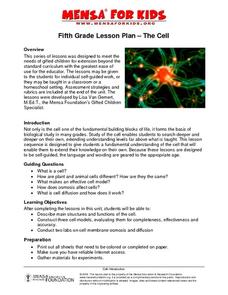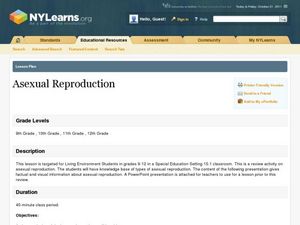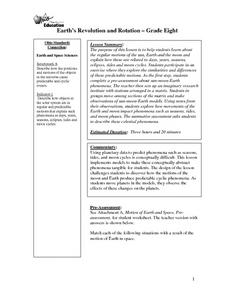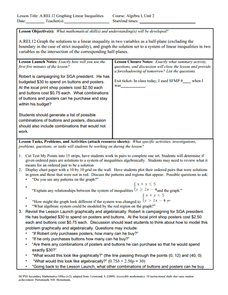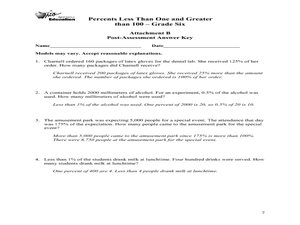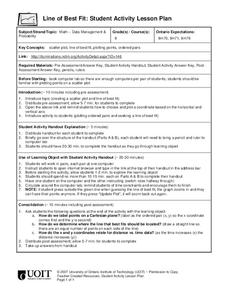Curated OER
Real-World Linear Equations
Eighth graders practice technology skills through the use of a spreadsheet and a discovery lesson focusing upon linear equations. The technology allows for the visual changes to be displayed for different lines of equations.
Curated OER
The Cell
Tenth graders explore the parts of a cell. In pairs, classmates construct a model of a eukaryotic cell, detailing its morphology and function. With the use of computer technology, 10th graders create cell book for middle schoolers. ...
Curated OER
In the News
Third graders participate in a lesson plan that helps to improve reading comprehension. They move through several activities that help them understand how to express their opinions, support their statements and communicate these...
Curated OER
Super Sort
Students sort objects based on one characteristic. They define the term "attribute" and give examples of attributes of objects. Students explain their reasoning for sorting objects into groups.
Curated OER
Cultural Impact of Jim Crow Laws and the Civil Rights Movement
Students examine the Jim Crow laws and how they impacted the lives of both African Americans and white Americans. They discuss the Civil Rights Movement and how their lives may have been different had it not occurred.
Groups...
Curated OER
Narrative Literature Response Letters
Third graders write endings to a story that has already been written. They offer alternative endings in their version. The lesson includes a rubric that is to be given to the students in order that they know the requirements.
Curated OER
Rhetorical Devices
Eleventh graders consider rhetorical devices in speeches and then make an informed selection of effective rhetorical devices for a controversial topic presentation. Students present their findings using presentation software.
Curated OER
Asexual Reproduction
Sixth graders investigate how asexual reproduction produces single-parent offspring. They use plants and yeast to demonstrate vegetative propagation and budding in a laboratory. Students draw five different types of asexual reproduction.
Curated OER
Rhetorical Devices
Twelfth graders identify and analyze examples of rhetorical devices as valid or invalid inferences. In this text analysis lesson, 12th graders research a controversial topic in teams and identify rhetorical devices for the topic....
Curated OER
Days of the Week
Students participate in a variety of center activities to reinforce the concept of days of the week and their succession. The concept of time can also be taught at the same time to introduce timekeeping.
Curated OER
Friendly Letter
Students write friendly letters. In this friendly letters lesson, students write a friendly letter on the given template after being given direct instruction on how to write a friendly letter.
Curated OER
Quadratic Relation and Parabola
Young scholars identify the vertex and intercepts of a parabola. In this algebra lesson, students graph parabolas and factor quadratic equations. They perform transformation on the parabolas.
Curated OER
Earth's Revolution and Rotation
Eighth graders investigate the regular motions of the sun, Earth and the moon and explain how these are related to days, years, seasons, eclipses, tides and moon cycles. They participate in an exercise where they explore the...
Curated OER
Persuasive Speech
Tenth graders participate in a lesson that is focused on the concept of writing persuasive speechs. They conduct research from a variety of sources in order to gather information to write well informed speeches.
Curated OER
Graphing Linear Inequalities
Eighth graders extend skills for representing and solving linear equations to linear inequalities. Lesson activities build understanding and skill by plotting ordered pairs of numbers that either satisfy or do not satisfy a given...
Curated OER
Percents Less Than One and Greater Than 100
Sixth graders express numbers as percents greater than 100 and less than one. For this lesson on percents, 6th graders work in groups with real life scenarios to develop an understanding on percentages greater than 100 and less than one....
Curated OER
Two-Dimensional Drawings from Three Dimensional Objects
Sixth graders identify and replicate two dimensional illustrations of three dimensional objects. In this spatial visualization lesson, 6th graders practice viewing objects from various sides. Student participate in stations to view...
Curated OER
Line of Best Fit
Students calculate the equation of the line of best fit. In this statistics lesson, students create scatter plots and find the line of best fit going through their data. They make predictions and draw conclusions.
Curated OER
Nets, Surface Area and Volume
Students calculate the surface area and volume of a sphere. In this geometry lesson, students define nets, surface areas and volume of prisms, pyramids, cylinders and cones. They use the computer to create nets and analyze shapes.
Curated OER
Electricity and Lightning
Students define important vocabulary words related to electricity and charges. In this physics instructional activity, students examine force created by electricity and lightning. They differentiate between the two forces and how they...
Curated OER
Electricity
Students identify the relationship between batteries, circuits and voltage. For this physics lesson, students investigate the way batteries are put into different apparatus. They discuss why different machinery need different voltage of...
Curated OER
I Can Do This! Systems of Equations
Students solve systems of 2-by-2 linear equations using tables,
graphs and substitution. In small groups, classmates work together to discover strategies for solving equations. They use a calculator to graphically represent their answers.
Curated OER
Solving Problems Involving Chords, Radii, Tangents, Secants and Arcs within the Same Circle
Tenth graders apply their knowledge of angles related to a circle, radii, secants, tangents and chords of a circle. They practice using formulas related to a circle. They also apply what has been practiced to real life situations.
Curated OER
Defining Regions
Fifth graders will work in cooperative learning groups to research North American regions and create presentations to share with their classmates. To show what they have learned, 5th graders will create maps of North American regions.



